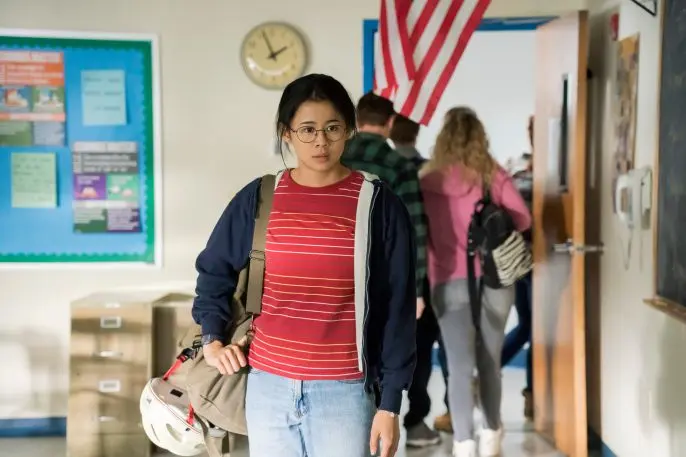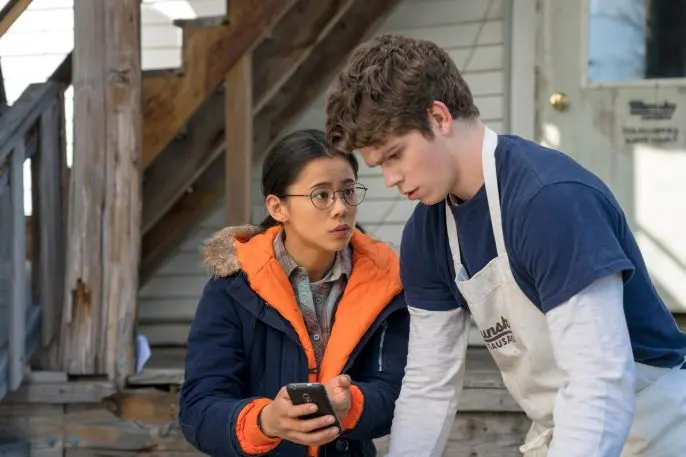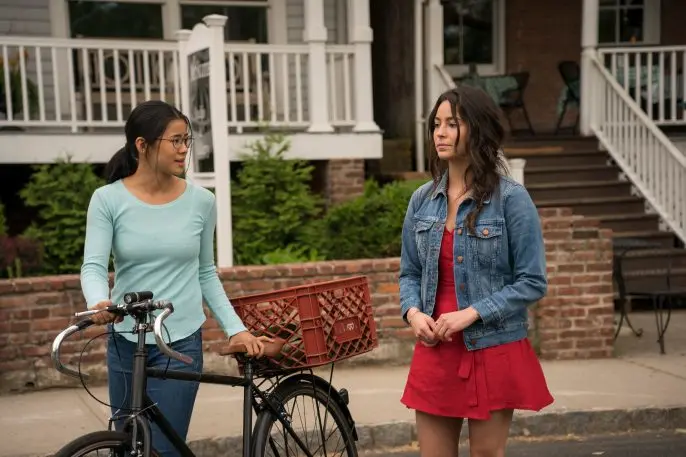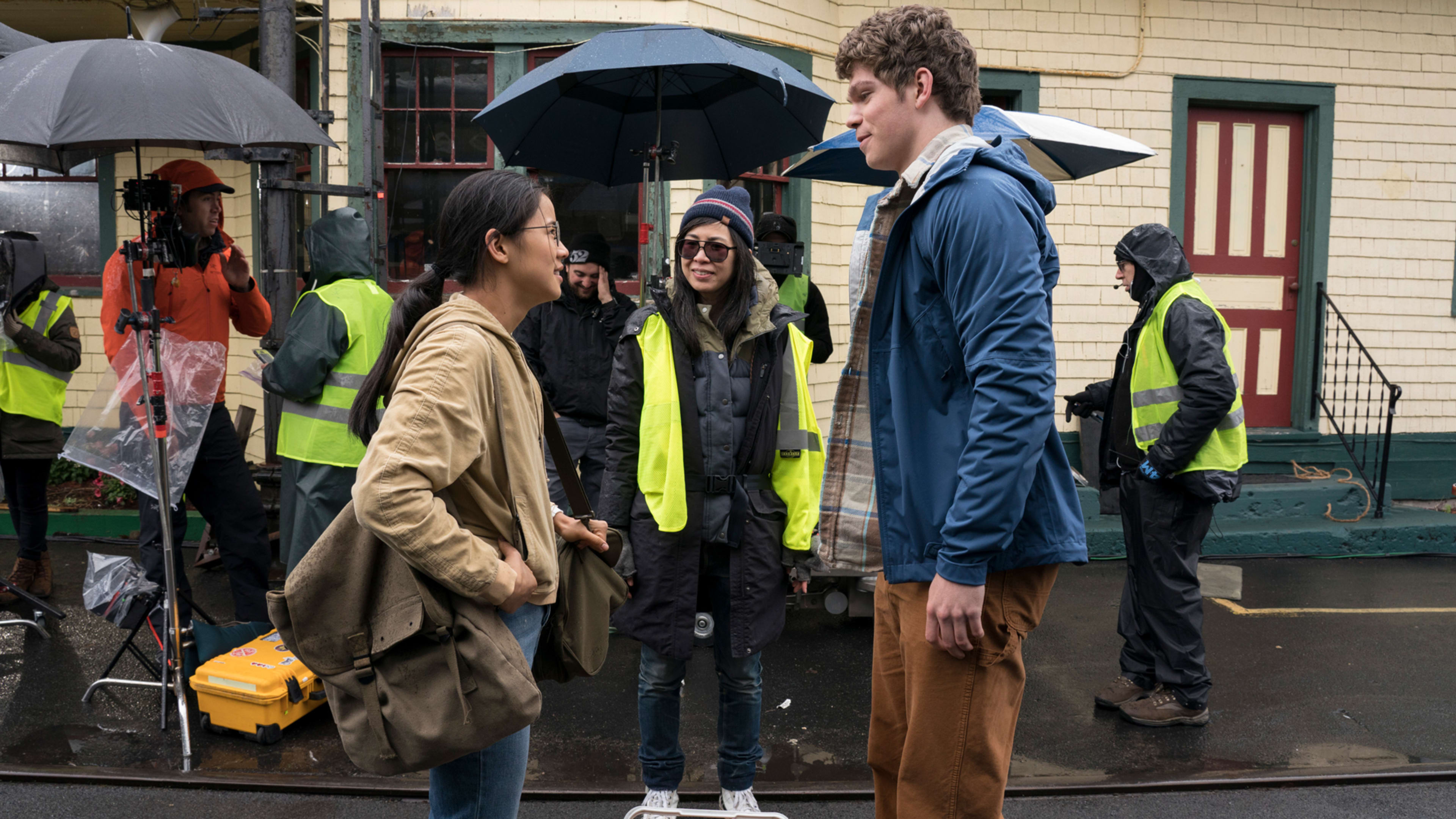Amid the current wave of inclusive storytelling, subverting the typical high school rom-com by making the geeky girl fall for the misunderstood queen bee instead of the jock with the heart of gold would’ve been enough for some. Make said geek both queer and Asian American and it would seem like there would be no more boxes left to check.
But Alice Wu would like to add a few more for your consideration.
Wu’s latest film, The Half of It, roughly follows that plot: Ellie Chu (Leah Lewis) is an introverted and studious 17-year-old living in Suquamish, Washington. Her side business of writing essays for other students runs into a bit of a curveball when football player Paul Munsky (Daniel Diemer) asks for Ellie’s help not with his homework but to write a love letter to his secret crush, Aster Flores (Alexxis Lemire).
What ensues is a modern-day Cyrano de Bergerac as Ellie, writing as Paul, develops a deep connection and feelings for Aster through their exchanges.
However, as the film’s tagline suggests, “not every love story is a romance.”
The Half of It is less about a queer love affair and more about the connections formed outside the scope of romance, namely the bond that forms between Ellie and Paul.
“I always wanted to write about how our definitions of love can be a little narrow,” Wu says, “and maybe there’s a way to broaden those definitions.”
The Half of It is loosely based on a real friendship in Wu’s life, but it wasn’t necessarily ready source material just bobbing at the surface. It’s a film that’s been more than a decade in the making. As unconventional as The Half of It is, the story of how it came to be, and Wu’s career as a filmmaker, are equally so.
Wu explains how a 15-year hiatus as a director led to the refreshingly unconventional The Half of It.
An unlikely filmmaker
Wu’s path toward filmmaking started as more of a creative itch to scratch than some long-standing ambition. While working as a software designer and manager at Microsoft in the late ’90s, Wu started taking night classes in screenwriting to learn how to flesh out an idea she’d been sitting on.
“I didn’t think it was going to get made. I was just blowing off some creative energy,” Wu says. “Then, when I suddenly had a script that was meaningful to me, I ended up quitting my job and moving to New York.”
That script became the 2005 indie darling Saving Face, a story about Wil, a young Chinese American woman struggling to come out to her very traditional family. But, as it turned out, her mother has secrets of her own: She’s pregnant.
The film was a critical success and made Wu the new director to watch.
“But I was like a deer in headlights when everyone was like, ‘What’s next?'” Wu says. “I couldn’t even dare to dream this could happen. So I wasn’t going to imagine what might happen beyond.”
Instead of starting on her next original script, Wu adapted novels to screen and did other work-for-hire gigs for studios. In 2007, she sold a TV show, Foobar, to ABC about her experiences as a woman working in tech. The writer’s strike hit later that year, putting everything on hold. But around the time that tensions began to thaw between the Writers Guild of America and the Alliance of Motion Picture and Television Producers, Wu’s mother fell ill.
“I dropped everything and moved to San Francisco,” Wu says. “It’s funny because it happens in both my movies.”
In Saving Face, Wil cares for her pregnant mom, and in The Half of It, Ellie takes on more than her share (and more than a teenager should) around the house to help her widowed father.

What was supposed to be a few weeks in San Francisco turned into months.
“I remember the day when one of my agents called me up and said, ‘Are you coming back?’ I guess in her mind she thought I was on a hiatus. But in my mind I thought I’d left the industry,” Wu says. “I’m not so grand that I announced to her, ‘I’m leaving the industry!’ I’m not Steven Soderbergh. But in my head, I thought to myself, ‘My twenties were about establishing myself and designing software. My thirties were about going off on this dream to make a film. And my forties are going to be about my family.”
An unlikely friendship
In San Francisco, where Wu currently lives, she began taking—and eventually teaching—improv classes. She also started looking into investments such as buying rental properties to stretch her savings. She was basically doing everything except writing.
“I didn’t write at all for maybe seven years,” she says. “I would attempt to think about writing, and it’d be such an exercise in self-flagellation.”
“I did a lot of very boring things,” Wu continues. “But it was also a very rich time.”
Moving from New York back to her home state started putting certain parts of her life into perspective—namely a dear, and unlikely, friend she made while attending Stanford.
Wu came out her senior year of college, and around the same time ended up becoming best friends with a straight guy who, aside from also being a computer scientist, was different from her in so many ways.
“He was the most instrumental in helping me accept myself as gay,” Wu says. “My family had a very hard time with it. I was too scared to come out to my other friends because I was like, ‘What if they think that I’ve had crushes on them all along?’ He didn’t treat me any differently. There was just such a genuine connection between us.”
One thing they connected over—and waxed about at length—was the concept of love.

And what happens when you find someone who’s your other half in every way except you’re a lesbian and he’s straight?
“I don’t think our society is necessarily the most sophisticated in being able to parse out the different forms of love,” Wu says. “What do you do in a scenario where in fairly straight heterosexist society, you have a lesbian and a straight guy friendship? It led to people maybe having a hard time understanding it and us even having a hard time. Like, what is this intimacy? This is one of the soulmates of my life, except neither of us has any desire to have sex with each other. So what is that?”
It’s what Wu set out to explore in The Half of It—not only with Paul’s and Ellie’s characters, but Ellie’s and Aster’s as well.

Fortunately, and without giving too much away, Wu took a more realistic approach to her ending.
“What happens if you meet someone who’s the last person on Earth you think will have anything to offer you? But then the two of you end up changing each other’s lives, which is Ellie and Paul,” Wu says. “And, in turn, Ellie and Paul ended up changing Aster’s life.”
It’s a brilliantly layered story that Wu says could have only come from having the necessary perspective, both in time and place.
“Back when we were so young, it was hard to figure out,” Wu says of her friendship. “Now that I’m a lot older, I’m able to look at it and understand it better.”
Recognize your brand’s excellence by applying to this year’s Brands That Matter Awards before the early-rate deadline, May 3.
